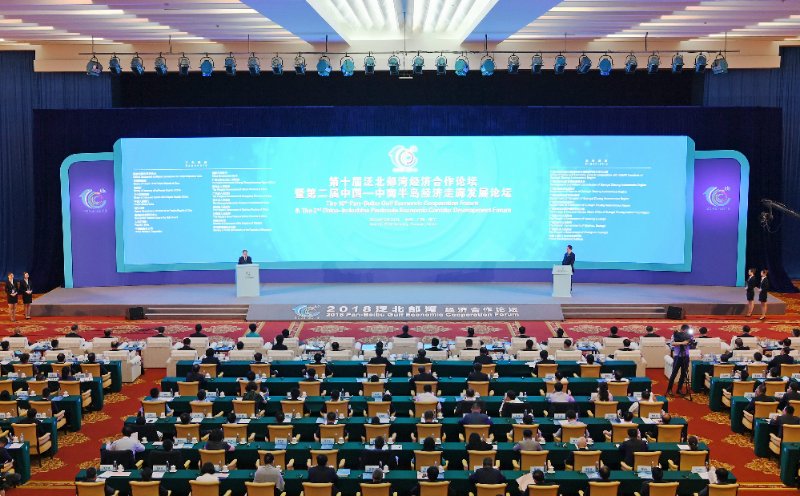
The news conference. [Photo/Office of Beibu Gulf Economic Zone & Cooperation with ASEAN Countries of Guangxi Zhuang autonomous region]
A forum aimed at strengthening the ties between China and Southeast Asia began on Thursday in Nanning, capital city of Guangxi Zhuang autonomous region.
Participants at the conference, themed "Build New International Land and Maritime Trade Routes for a China-ASEAN Community of Shared Future", discussed the building of a "Southern Transport Corridor". The meeting served as the 10th Pan-Beibu Gulf Economic Cooperation Forum & the 2nd China-Indochina Peninsula Economic Corridor Development Forum.
Ma Biao, vice-chairman of the National Committee of the Chinese People's Political Consultative Conference, China's top political advisory body, noted in opening remarks that this year is the 15th anniversary of China's strategic partnership with the Association of Southeast Asian Nations, or ASEAN, and that it's time for both to work together, pushing China-ASEAN cooperation to a stronger level under the framework of the Belt and Road Initiative.
Goods from the western provinces of China could be shipped to Singapore through Beibu Gulf in Guangxi with less time than what's currently required, as that's the shortest access to ASEAN countries, he noted.
"The Southern Transport Corridor is a critical platform for China, especially for the western areas, to enhance their logistic cooperation with ASEAN and European countries, and a great opportunity for ASEAN countries as well," Ma said.
Lu Xinshe, Party chief of Guangxi, said the autonomous region is playing a vital role in the building of the Southern Transport Corridor.
In coming years, Lu said, Guangxi will exert maximum efforts "to accelerate the infrastructure connectivity with Asian countries and deepen the cooperation, especially in transport and logistics areas."
Tan Wu Meng, Singapore's senior parliamentary secretary for the Ministry of Foreign Affairs and Ministry of Industry and Trade, proposed that infrastructure connectivity in the region be enhanced.
"A key example of how ASEAN and China can do so is through the China-Singapore (Chongqing) Connectivity Initiative Southern Transport Corridor, or CCI-STC," Tan said.
The CCI-STC is a multimodal corridor intended to facilitate seamless goods movement between China, Singapore, Southeast Asia and the rest of the world.
President Xi Jinping has positioned the CCI-STC as the international land and sea trade corridor that connects the overland Silk Road Economic Belt with the 21st Century Maritime Silk Road.
"The CCI-STC is an open platform and Singapore welcomes more parties to use it," Tan said. "We are happy that Guangxi is an early supporter of the CCI-STC together with Chongqing, Gansu and Guizhou. With more stakeholders on board, we will aggregate volume, build economies of scale and lower logistics cost, which will benefit both ASEAN and China."
With the joint efforts of the Chinese government and ASEAN countries, the Forum has become a major sub-regional cooperative program – as well as one of the most dynamic, substantive and fruitful gatherings under the framework of China-ASEAN cooperation – since it was first held in 2006.
The Forum is co-sponsored by China's National Development and Reform Commission, Ministry of Transport, Ministry of Commerce, Ministry of Culture and Tourism, People's Bank of China, General Administration of Customs, the Development Research Center of the State Council, People's Daily, China Railway Corporation, China Development Bank, the government of Guangxi Zhuang autonomous region, the governments of Hainan, Guangdong, Chongqing, Guizhou and Gansu as well as the Ministry of Commerce of Thailand and the Ministry of Trade and Industry of Singapore.